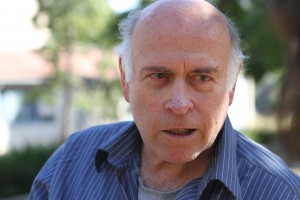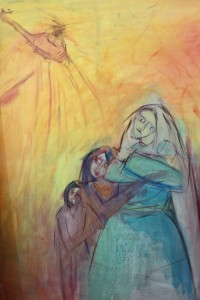Washington Physicians for Social Responsibility return to Gaza
By Gerri Haynes
(Gerri Haynes, a former president of Washington Physicians for Social Responsibility, will be sending back reports from inside blockaded Gaza. As she did three times before, Gerri organized a team of doctors and other health care providers to work in hospitals and clinics in Gaza in an effort to directly help the people there and to bring attention to the ongoing humanitarian crisis that the Israeli blockade has created. First in the series.)
Five members of Washington Physicians for Social Responsibility and one intrepid member of Oregon Physicians for Social Responsibility arrived in Gaza yesterday – hoping to provide medical care and consultation to this besieged population. This is the fourth WPSR delegation to travel to Gaza in the last two years.
The 1.6 (or more) million people of this small strip of land are captives of a situation that offers them no free access to the rest of the world. Once, they were able to move relatively freely through Palestinian and Israeli lands. Many Gazans worked daily in Israel. Many visited their families in the West Bank. For nearly five years, the only “free” movement has been through the dangerous tunnels that connect southern Gaza with Egypt. More on that below!
We made our way to Gaza through Israel, Jerusalem and Bethlehem, meeting interesting people along the way.

Amos Givertz, an Israeli working to help the Bedouin population of the Negev Desert (Photo by Bob Haynes).
Laura Wharton is a member of the left-wing Meretz Party in Israel and was elected to serve (without pay) on the Jerusalem City Council. She met with our group at the Notre Dame Hotel to talk about actions to increase services to Palestinians living in East Jerusalem. She says Arabs are rapidly immigrating to East Jerusalem and the cost of housing is sky-rocketing. Issues of water and infrastructure such as schools in East Jerusalem remain challenging for the City Council. One complicating factor for management of City finances is the presence of a large number of ultra-orthodox Jews in West Jerusalem. The ultra-orthodox do not have to work, serve in the military or pay taxes, yet receive social services and stipends for studying in the Yeshiva.
We were to cross (by permit) into Gaza on Thursday but the border was closed for a holiday. Friday morning, we crossed through to the Gaza side with no difficulties and were joyfully greeted by our hosts from the Gaza Community Mental Health Programme. Gaza has experienced many attacks by the Israeli military since our last visit here and we witnessed some of the building destruction as we traveled.
Our group is comprised of three physicians and three nurses and following a brief tour, Rich Grady and Laura Hart began their work by screening more than 30 urology patients.
During our tour, we witnessed several community celebrations – people gathering in the streets – welcoming home prisoners who were released this week by Israel in the prisoner exchange for the Israeli soldier, Gilad Shalit.
We stopped to meet with one prisoner who was held for 26 years in various Israeli jails for having participated in protests against the Occupation. He said he had not killed anyone. Sitting near this prisoner was his son, an attorney, who was eight months old when his father was imprisoned and the prisoner’s brother whose own son was killed recently in Gaza in a targeted assassination by Israeli forces. The released prisoner requested that Human Rights activists seek a review of conditions in Israeli jails. He learned two days prior to his release that he was to be set free. He had had no contact with his family since 1995.Traveling south, we stopped at the Rafah border to witness the preparation of another tunnel from Gaza to Egypt. These tunnels carry goods into Gaza and provide a lifeline around the ongoing siege while the people of Gaza continue to hope for a peaceful resolution to the conflict between Palestine and Israel.
1 Comment to “Washington Physicians for Social Responsibility return to Gaza”
RSS feed for comments on this post. TrackBack URI

By Nancy Jarmin, October 22, 2011 @ 6:10 pm
My thanks to Gerri and the others in this delegation.